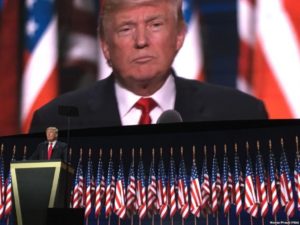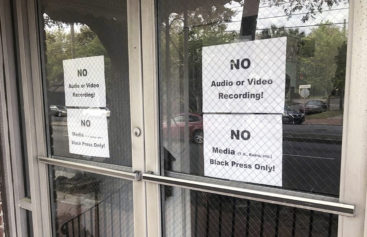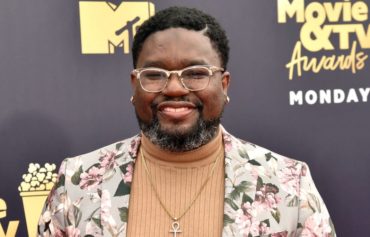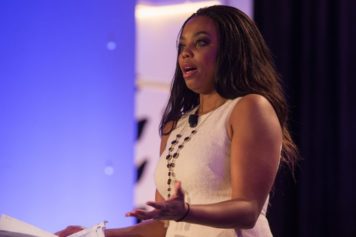
President Donald Trump has repeatedly attacked news organizations and reporters whom he deems as hostile to him. (Source: Wikimedia Commons)
The First Amendment, with its guarantees of freedom of speech and freedom of the press, is among the most cherished rights in U.S. democracy. President Donald Trump, his administration and surrogates have faced criticism for attacking the First Amendment rights of journalists, for targeting individual journalists and news operations, and for attempting to shut down criticism of the president and his policies.
The First Amendment reads:
Congress shall make no law respecting an establishment of religion, or prohibiting the free exercise thereof; or abridging the freedom of speech, or of the press; or the right of the people peaceably to assemble, and to petition the Government for a redress of grievances.
A most recent example of the pushback journalists have faced from Trump is Jemele Hill, the ESPN journalist and SportsCenter co-host who tweeted that Trump is a white supremacist:
Donald Trump is a white supremacist who has largely surrounded himself w/ other white supremacists.
— Jemele Hill (@jemelehill) September 11, 2017
Hill’s tweets generated criticism from White House Press Secretary Sarah Huckabee Sanders two days later. “I think it’s one of the more outrageous comments that anyone could make and certainly something I think is a fireable offense by ESPN,” Sanders said at a press briefing Wednesday. In response, the Democratic Coalition, an anti-Trump Super PAC, filed two ethics complaints against Sanders with the Office of Government Ethics. The second complaint came when Sanders called ESPN “hypocritical” for suspending anchor Linda Cohn after she questioned the company’s business strategy.
Trump responded on Twitter that ESPN “is paying a really big price for its politics (and bad programming). People are dumping it in RECORD numbers. Apologize for untruth.”
Hill is not the only Black journalist the Trump administration has targeted. Last March, reporter April Ryan and then-White House Press Secretary Sean Spicer had a heated exchange over the alleged scandals plaguing the Trump White House. Spicer told Ryan, “I’m sorry, please stop shaking your head again.”
When MSNBC’s Joy Reid made a joke on Twitter referencing fired Trump adviser Sebastian Gorka’s alleged Nazi ties, a Trump-aligned group condemned her.
When you get fired on vacation and Kelly yanks your temporary security clearance before you can get back. #Gorked #DidNaziThatComing pic.twitter.com/IOx8GOC1is
— Joy Reid (@JoyAnnReid) August 26, 2017
The Zionist Organization of America (ZOA) — a right-wing Islamophobic pro-Israel organization bankrolled by top Trump donor and casino magnate Sheldon Adelson — demanded that she apologize and retract her statement.
At their best, journalists provide a check on those in power. The Black press carries a long legacy of speaking out against injustice, amplifying the voices of underrepresented and empowering the community. In the era of Trump, it is not surprising that Black journalists would come under attack, particularly for calling out racism. However, Black journalists are not alone in facing retaliation from this administration.
During an August press conference, CNN reporter Jim Acosta asked Trump why he did not condemn the hate groups involved in the Charlottesville white supremacist rally by name. “It doesn’t bother me at all, but, you know, I like real news. Not fake news. You’re fake news. Thank you everybody,” Trump responded.
Before he was elected, candidate Trump previewed how his administration would treat the press with open displays of animosity toward reporters. In August 2015, Trump expelled Univision’s Jorge Ramos from a press conference while the two sparred over undocumented immigrants. “Sit down, you weren’t called. Go back to Univision,” Trump said to the reporter. When he was allowed to return, Ramos told Trump that “No human being is illegal.” Earlier that month, Trump faced claims of sexism when he said that Republican presidential debate moderator and then-Fox anchor Megyn Kelly had “blood coming out of her eyes, blood coming out of her wherever. In my opinion, she was off base.”
Throughout his candidacy, Trump continued to taunt and berate NBC reporter Katy Tur for her reporting of his campaign. Trump said Tur “should be fired for dishonest reporting,” and once called her out in public during a South Carolina rally, calling her “Little Katy” and a “third-rate reporter.”
Also during the campaign, Trump campaign manager Corey Lewandowski reportedly manhandled Breitbart reporter Michelle Fields following a press conference in Florida. Tur wrote in her new book that she was mortified when she received an unwanted kiss on the cheek from Trump.
As president, Trump has favored conservative media outlets in press briefings, and has at times banned access to certain outlets such as CNN, BBC, The Guardian, The New York Times, the Los Angeles Times, Politico and Buzzfeed.
Sometimes U.S. media are banned from certain events entirely For example, when Trump hosted Russian Foreign Minister Sergey Lavrov and then-Ambassador Sergey Kislyak at the White House in May, U.S. media were not allowed in the Oval Office. However, the Russian state-owned news agency was allowed in the meeting, where the Russian photographer took photos and posted them on social media. When U.S. media were eventually allowed, the Russian officials already had left. This meeting came the day after Trump fired FBI Director Jim Comey, who was investigating ties and possible collusion between Russia and the Trump campaign in the U.S. election.
Ambassador Kislyak and President Trump / Посол С.Кисляк и Президент Д.Трамп pic.twitter.com/Ckkx2YL9KX
— Russia in USA 🇷🇺 (@RusEmbUSA) May 10, 2017
A vibrant, free press is necessary for democracy to flourish. Other presidencies have had their clashes and differences of opinion with particular journalists or news organizations. However, Trump has called the media “the enemy of the American people” and has referred to reputable news organizations with whom he disagrees as “fake news.” One one occasion, he even tweeted a mock video of him beating up a CNN stand-in, with the hashtags #FraudNewsCNN and #FNN. The man behind the GIF that Trump tweeted apologized, insisting he does not advocate violence against the press. He has, however, posted racist and anti-Semitic imagery on social media.
#FraudNewsCNN #FNN pic.twitter.com/WYUnHjjUjg
— Donald J. Trump (@realDonaldTrump) July 2, 2017
When a leader of a democracy exhibits such behavior, this raises serious concerns, as authoritarian regimes, distrustful of the press, seek not only to revoke their access, but to scapegoat them and drive them out of existence.


